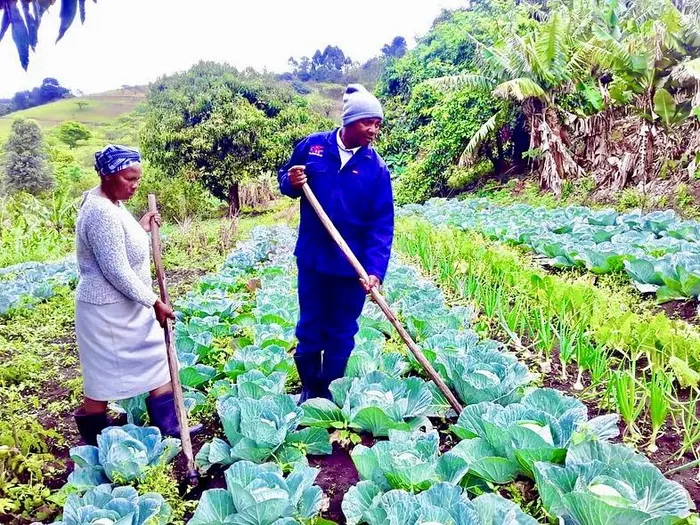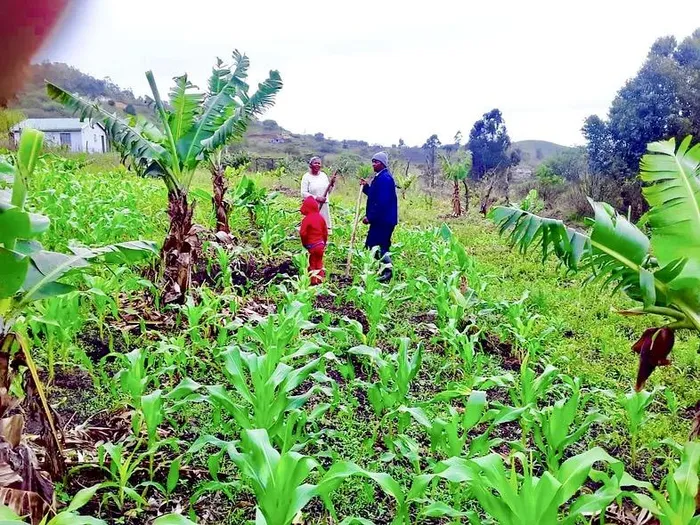
The Qwabe family's, abundant vegetable harvest
Image: Thenjiwe Qwabe
The Spring-Summer seasons have long been known as the ideal season for planting, and in KwaZulu-Natal, the conditions couldn’t be more perfect. With a balanced combination of heat and rainfall, this season gives plants exactly what they need to grow strong and healthy. In fact, the eastern parts of KZN enjoy especially fertile soil at this time, making it easier than ever to start a small home garden for fresh, home-grown food.
Research has shown that having a garden at home is good for your health. Gardening promotes physical activity, reduces stress, and gives families access to healthier, chemical-free food. According to KwaZulu-Natal Business Agriculture, the province boasts rich soil, abundant rain, and high-yielding fields—ideal for planting almost anything, from vegetables and herbs to fruit trees.
Some of the best vegetables to plant now include spinach, cabbage, carrots, beetroot, maize, potatoes, green peppers, and tomatoes. While most fruits take longer to mature, strawberries are an exception, growing fast enough to harvest within the season.
KwaZulu-Natal farmer Abednego Qwabe encourages residents not to wait. “Those who planted in July are already harvesting. But it’s not too late—if you start planting now, by December you’ll be harvesting your own production. Especially those started in a seedbed,” he says. “Most plants only need about three months to grow.”

Maize Garden, with a little mix of banana tress you can plant this season.
Image: Thenjiwe Qwabe
A vegetable seedbed is a great starting point, especially for beginners. It’s a small, protected area where seeds are first planted and grown into seedlings before being moved to a garden bed. Seedbeds should be in a sunny location, sheltered from wind, and prepared with loose, compost-enriched soil. The surface should be smoothed out, and seeds must be sown at the right depth.
This method works well for crops like carrots, beans, peas, and lettuce, as well as seedlings for tomatoes, broccoli, and kale. According to local grower Thandokuhle Mvelo, proper care is crucial. “These plants need water and direct sunlight. Don’t leave them unattended for more than two days without watering—they could die,” he warns.
For fast results, try planting radishes, which mature in just three weeks. Spinach is another great choice, especially since it thrives in cooler temperatures. Other vegetables that do well this season include onions, garlic, pumpkins, and tomatoes.
Though fruit trees take longer to produce, Spring-Summer is still the best time to plant them. This gives them a chance to develop firm roots before winter arrives. Trees like oranges, litchis, mangoes, blackberries, bananas, watermelons, and strawberries can all be planted now.
Certain fruits need support as they grow. “Granadillas, tomatoes, grapes, and strawberries need a small tree or sticks to support them,” said Bonisiwe Mhlongo, an experienced business farmer. “Their branches are too weak to carry the fruit on their own.”
Watermelons need warm soil and take about 80 to 100 days to grow. Pineapples, while slow-growing (2–3 years), require little water and thrive in warm, sandy, well-drained soil.
Ultimately, planting goes beyond farming; it’s about nurturing a healthy, sustainable environment. With proper timing and care, anyone in KZN can successfully grow their own food this season and reap the benefits.
IOL